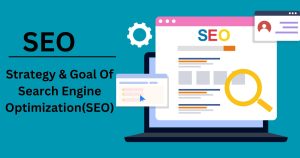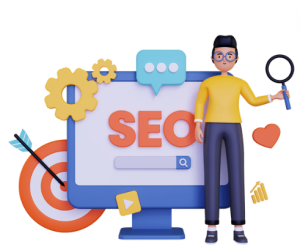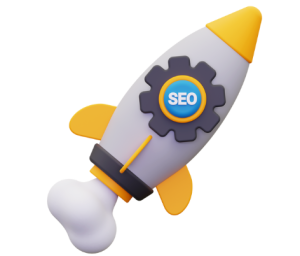
What is SEO?
By Taslima Akter – May 13, 2024
Hi, I am Taslima Akter having experience on all types of SEO work for several years and help people to setting up a all types of businesses on Google SERP pages. Today I am here to present some urgency about what is SEO, its strategy and its goals.
Search Engine Optimization is the procedure employed to make a website more recognizable and crucial for advertisement on the Search Engine Results Page without the use of paid advertisements. Today, users turn to search engines such as Google, Bing, and Yahoo becoming the primary source of information and a way to find products and services – SEO is highly relevant for the success in online space.
In its simplest terms, therefore, SEO is the science or art of comprehending and satisfying users’ needs.
The term techniques refers to algorithms deployed by search engines in identifying appropriate and relevant web pages and authors in response to the user query. These algorithms consider numerous factors when ranking web pages: These algorithms consider numerous factors when ranking web pages:
- Keywords: Keywords refer to the words and phrases used by individuals when they are conducting a search for information in the internet. To tie into the second aspect of search engine marketing, businesses can create relevant website content, titles, headings and meta tags that can improve their chances of being searchable when peoples type in the corresponding keyword.
- Content Quality: Media content must be professional and informative, must contain the right keywords, and is supposed to be interesting to the target audience. The popularity of a website as a ranking parameter is based on search engines’ ability to reward relevant content. The articles should timely, well composed, relevant to the set market and should not be repetitive or stale.
- Backlinks: Links from other web sites to your web site or links that point to your web site are also referred to as back links. Backlinks, from the perspective of the search engines, are considered positive endorsements or popularity votes. Hypothetically, a website that receives many backlinks from other reputable and trustworthy sites is likely to rank higher among the search results.
- Website Structure and Navigation: A well structured site synchronized with the organizational layout also assist the search engine in crawling and indexing its web pages. Proper website navigation is extremely beneficial to the user since it allows a site’s visitor to easily locate everything she/he may be interested in.
- Mobile Friendliness: Most of the people have been using their mobile devices such as smartphones and tablets while conducting their searches and as a result, search engine results prefers sites that are optimized for mobile use. Mobile friendly websites can load fast, adapt to different or one’s preferred resolutions and are easily navigable.
- Page Speed: Another parameter that was noted relates to the webpage speed which is an essential aspect of SEO. Most search engines give preference to sites that take shorter amount of time to load as this is not good for the users in case of taking time in loading the site makes the users to bounce back.
- User Experience (UX): User experience major facets include the layout or the design, the structure, and general feel of the website. Such websites are highly likely to gain a better rank in the search engine ranking pages or SERPs as they are referred to.
- Local SEO: If organizations operate within specific geographic regions and have most of their customers within this region, then local search is of paramount importance. The processes covered here include optimizing Google My Business listing, geo- keywords integration and acquiring reviews and citation from the local directories.
Note also that whereas keyword research should be considered a one-time process, SEO is a constantly refined ongoing process. Search Engines also update algorithms frequently making it suitable for SEO to be updated frequently to sustain and even enhance ranking.
What is the need for SEO?
SEO is an important part of the online marketing and promoting a website on the Net. As far as I know, it is the concept of optimizing website to be more visible within the results listed on search engine results pages. Increased Visibility: As the fact, millions of users make billions of search queries.

Every day on Google, Bing, and Yahoo search engines or any other recognized search engines, SEO assists your website to feature in local results hence exposing it to those visitors who may have an interest in what your site offers.
- Organic Traffic: SEO, is the process of improving your website in a way that will allow you to rank higher on search engines for organic traffic, or users who end up on your site from a SERP that was not paid advertising. The use of organic traffic is usually more effective because the buyer is more likely to and has a higher chance of converting.
- Credibility and Trust: Some considerations for search results include truth: websites that are listed higher ranked are considered more trustworthy by users. Optimizing website will thus increase your reputation within the domain and in return be capable of commanding the confidence of the clients.
- Better User Experience: Algorithms: SEO covers aspects such as how fast your site loads, its responsiveness to mobile devices, and its navigability. When the factors are optimised, then the general usability of a site improves, which in turn improves visitation levels and reduces bounce levels.
- Competitive Advantage: Incidental factors: Competing in the modern world wide web, SEO provides a competitive advantage over the competitors. This way, many potential customers will see your website before seeing theirs and you can gain a lot of customers this way.
- Cost-Effectiveness: I also have come to realize that though paid advertising can be effective in the sense that one can gain a lot of traffic in a short time hence achieving goals and objectives in the short run it may be very expensive. While pay per click provides immediate and specific traffic, SEO provides cheaper and longer-term solution to your company’s web traffic problem. After the job is done right and your site appears at the top of the lists, the visitors you get are almost costless.
- Insight into Customer Behavior: No matter what type of SEO tools and analytics are used, they are helpful to find out the details of the customers who are already visiting at your site with the keywords they are using, devices they are using, and which pages are frequented by them. These pieces of information can be useful in your general marketing or advertising plan and assist in identifying your precinct public.
- Adaptability to Algorithm Changes: It was also very much clear that the rules of the given search engines are very dynamic and what is actually effective in a given time may not be effective later. This means SEO is not a one-time process but rather it is a continuous process since Google frequently updates its algorithm and will always look for ways of diminishing the impact of a certain site from its search results.
- Global Reach: One of the biggest benefits of SEO is that you can take your business all over the world and establish yourself as an authority online without necessarily having to open a physical office in every country. In this way it still caters for visitors from around the world, as they are more likely to come across your site when they are using an international search engine or if they prefer using another language to the base language of the site.
- Long-Term Growth: Unlike most advertising methods that may only give immediate returns, SEO’s advantages are more permanent. In this respect, it is replenished through the active improvement of SEO on the website and the subsequent increased popularity of the site and the appearance of more customers.
The Mass Guide to the Stages of Search Engine Optimization (SEO)
The integrated but diverse application of SEO goes a long way in making it one of the crucial tools in the modern business world that targets improving brand awareness and website traffic in the natural sense for any business. SEO is not a single-step affair; instead, it is a systematic procedure that occurs in phases with the ultimate goal of enhancing the position of the site on SERPs. In this regard, we pointed earlier to how SEO is slowly shifting to cost in all areas of operations. There are multiple stages that can be involved in SEO; let us discuss these stages for you to know how to go through the whole process suitably.
-
Research and Analysis
-
On-Page Optimization
-
Technical SEO
-
Off-Page Optimization
-
Content Marketing
-
Monitoring and Iteration
comprehensive SEO starts with research and proceeds through analysis and implementation, with continuous monitoring and improvement in between. Understanding and following these stages, along with the right SEO tactic will assist businesses in enhancing their online visibility and acquiring the desired organic traffic to meet the specific targets of their digital marketing campaigns. It is very important to understand that SEO is a marathon and not a sprint as it requires continuous effort and constant optimization for achieving long-term goals in the continuously competitive and evolving online landscape.

Covering the Most Common Goal of SEO: Enhancing Online Visibility and Driving Organic Traffic

While the field of digital marketing is widening and expanding over time, the concept of Search Engine Optimization or SEO is one of the core strategies that any business venturing online should consider. At the heart of SEO lies a singular goal that resonates across industries and sectors: search engine optimization, social media marketing, and improving internet traffic or any other related solutions. Thus, in this vast expansion, we have made an attempt to decode this common, yet profound concept of this core purpose and comprise its meaning, approach, and outcomes in relation to the companies’ digital success.
Here are some tips that would help marketers in digesting the real essence or fundamental purpose of SEO.
-
Understanding the Core Goal of SEO
The core concept of SEO is based on effective website visibility and its presence in the Search Engine Result Pages (SERP). Like every business aims at getting its link on the first page of the Search Engine Result Page; everyone also understands that better visibility equals more chances of the target consumers getting to see it. This core goal of SEO is driven by the desire to. This core goal of SEO is driven by the desire to:
- Boost Organic Traffic: The organic traffic is the type of client that visit your website through a search engine and not a paid advertisement. When you utilize SEO, you target to get genuine traffic to your site for people looking for what you offer, and not when they have clicked on an advertisement, and therefore helps in building a sustainable online marketing strategy.
- Enhance Brand Visibility: Apart from boosting up the traffic, the ranking that one acquires puts the brand on a central stage such that everybody gets to see. If a consumer sees your website on regular basis within his/her relevant search intent, there is a positive impact on consumer’s perception towards the brand since it gains the impression of being an authority brand.
- Maximize Conversions: The main goal of generating traffic to its website is to convince the visitors to purchase products or avail of the services or at least capture their contact details for future marketing communication. Thus, it becomes quite apparent that if SEO techniques are applied carefully in such a manner that constructively impacts user experience then website gets more traffic, thereby improving its ROI factor.
2. Strategies for Achieving SEO Goals
To complete the main goal of improving the site’s rank and overall traffic that come from organic searches there is a need to undertake numerous techniques that make up the SEO. Here are some key strategies employed by businesses to attain this goal: Here are some key strategies employed by businesses to attain this goal:
- Keyword Optimization: This is where efficient keyword research comes in, followed by incorporation of appropriate keywords in the websites as commonly used searches need to be reflected as well. Businesses when focusing at specific and valuable keywords, they are able to hit the interest of the target users of their ads.
- On-Page Optimization: Caching and indexing are just a part of the process of optimizing individual web pages for specific keywords and phrases; it also involves the use of metadata tags, website speed and appearance, and high-quality content. On-page optimization makes it possible for a given web page to rank higher in the search results and also portrays a relevant user experience.
- Link Building: Linking external websites to a site is an essential concept in SEO that has not been thoroughly eliminated as it serves as recommendations of websites. Many businesspersons should consider ways of attaining quality backlinks from the right websites because this factor helps to improve their domain authority and allows them to rank higher.
- Content Marketing: It attempts to answer the question about the fact that content forms the basis of SEO through which one can reach specific audiences, offer value, and position them as authorities in a particular field. To achieve these objectives, firms should generate valuable content and share them on the available platforms to gain site traffic, backlinks and customer goodwill.
- Technical SEO: Ensuring the design elements of a website like structure, speed, mobile responsiveness and schema are good are critical in enhancing differential crawling and indexing by search engines. Technical SEO is the process of making a website compatible with search engine guidelines and ensuring the website’s visibility on search results.
3. Impact and Benefits of Achieving SEO Goals
The impact of achieving SEO goals extends far beyond improving search engine rankings; it encompasses a myriad of tangible benefits that contribute to the overall success of a business: The impact of achieving SEO goals extends far beyond improving search engine rankings; it encompasses a myriad of tangible benefits that contribute to the overall success of a business:
- Increased Website Traffic: It effectively lets businesses become more search engine friendly and increase the sites traffic instead of just relying on the random visitors, thus increasing the circle of potential buyers.
- Enhanced Brand Authority: Ranking in the first page and ranking high define a brand and provide it with the creditability consumers bank on across the market leaving it above other brands.
- Improved User Experience: Good SEO techniques address both search engine optimizers and users to enhance the experience of users and ensure the page is ranked higher than the other ones. An optimized web site with relevant content, well-defined and easy to navigate structure and loading time increases the chances of usability and ultimately, people’s buying behavior.
- Long-Term Sustainability: As we have seen, paid advertising has instant solutions, which makes their results more temporary compared to SEO, which provides sustainable standing within the search results. In this aspect, businesses build foundations to sustain and continually boost the success rate in the digital environment through SEO advantages.
- Measurable ROI: It’s beneficial to track, monitor, and optimize SEO based on different parameters such as website visitor traffic, individual key phrases ranking, conversion rates, and modelling of overall SEO effectiveness. This allows companies to determine whether their SEO campaigns are yielding an adequate amount of traffic to warrant further investment, or whether changes need to be made for an improved performance.
Conclusion:
In the dynamic and competitive area of digital marketing, the ultimate goal of SEO remains constant: for improving the websites ranking and making it easier to appear at the top of searches without doing it manually. In essence, SEO is an excellent strategy that businesses should embrace to get a much larger share of the market, engage customers more attractively, convert more and sustain themselves for very long. With advancements in technology and changes in consumption patterns, it proves smart and worthwhile for any business to integrate itself with search engine optimization to reap the benefits of the digital economy today.